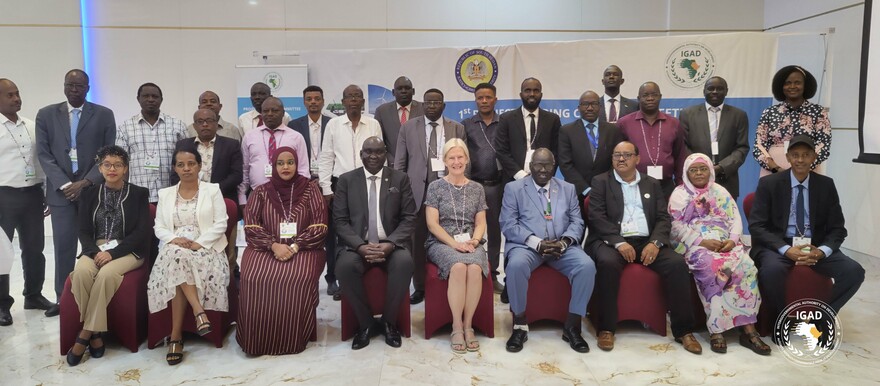The first-ever steering committee meeting for the Intergovernmental Authority on Development (IGAD) Blue Economy kicked off in Juba on Tuesday.
IGAD developed a 5-year Blue Economy strategy (2021-2025) and Implementation Plan (BESIP) aligned with Africa’s Blue Economy Strategy with the financial support of the European Union.
Speaking to the media during the opening session, Eshete Dejen, Program Manager for the Sustainable Environment Protection of IGAD said the meeting aims to discuss member states’ progress in the implementation of the Blue Economy Strategy.
“This meeting is the first steering committee meeting that all IGAD member states are here to review what they are doing in terms of blue economy, what are the processes of development of the national blue economy strategies of respective member states and we are planning the way forward on the project implementation,” Dejen said.
IGAD’s Blue Economy Strategy and Implementation Plan intends to structure the Blue Economy implementation at both national and regional levels while increasing cooperation and regional integration, as well as strengthening support to the member states to effectively translate policies into concrete actions.
Dejen said they seek to diversify the water resources to positively contribute to the economic development of the member states.
“Blue economy is a new concept, a new approach that integrates the different sectors like fisheries, tourism, water transport, hydropower mineral underwater so blue economy is a concept to use the resources associated with water in an integrated manner,” he added.
For his part, Onyoti Adigo Nyikwec, Minister of Livestock and Fisheries said South Sudan hosting the Blue Economy brings in new opportunities for diversifying the economy.
“It is a new opportunity for strengthening among others food and nutrition and security through diversification of livelihoods in conservations of aquatic biodiversity for the social well-being of the people of South Sudan, the IGAD region, Africa, and indeed the world at large,” Adigo said.
He revealed that South Sudan’s fisheries sector remains untapped although the country has a variety of fish species and the availability of fresh water.
“South Sudan encompasses the largest freshwater wetlands in Africa, the Sudd; which includes the Bahr el Jebel section, the Bahr el Ghazal and the White Nile sections between Bor and Malakal towns,” he explained. “The Sudd area includes 8,300 km2 of permanent swamps and over 80,000 km2 of the inundated area during the flood season. The estimated fisheries production along the Sudd Wetlands alone is about 140,000 tons per year on a sustainable basis; these estimates were based on water surface area and the Sudd area coverage. The Sudd Wetlands host more than 116 fish species in diversity; these potentials, however, remain underdeveloped.”
Meanwhile, Ulla Andrén, Head of the Regional Development Cooperation for Africa in the Embassy of Sweden in Addis Ababa said the IGAD countries have a great blue economy potential that is underused.
“Traditional sectors such as fisheries, tourism, mineral extraction, and marine and river transport are showing evidence of significant development capacities while emerging sectors such as aquaculture, marine biotechnology and bioprospecting, desalinization and renewable energy are currently lacking attention and request substantial investments in the near future,” she said.
The blue economy, a relatively nascent concept, has been defined variedly by different entities. According to the World Bank, the blue economy is the “sustainable use of ocean resources for economic growth, improved livelihoods, and jobs while preserving the health of the ocean ecosystem.” The European Commission (EC) defines it as “All economic activities related to oceans, seas, and coasts. It covers a wide range of interlinked established and emerging sectors.”




